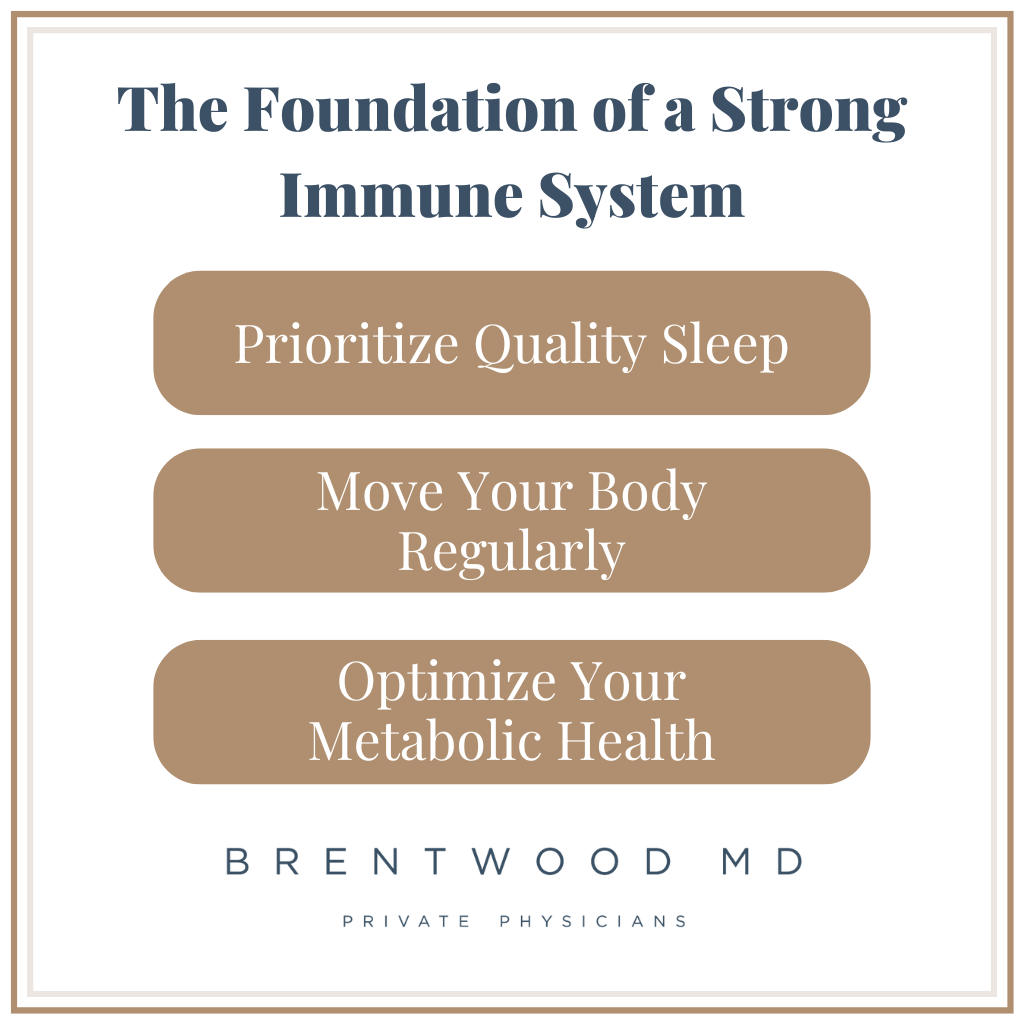Does the flu shot weaken your immune system?
It’s just one vaccine-related question on people’s minds as flu season approaches.
Vaccines sit at the center of a lot of discussion, strong emotions, and controversy right now. I have no intention of wading into that maelstrom, nor do I feel qualified to.
However, as a physician practicing concierge medicine, I do have something to say about vaccines in general, including the flu vaccine.
When it comes to vaccination decisions, the conventional medical establishment takes a population-based approach, rolling out schedules and recommendations across our nation as a whole. As a concierge physician, I prefer to take an individualized approach, starting with a comprehensive knowledge of each patient and then considering what makes the most sense for their unique health profile.
So, rather than getting into specifics like does the flu shot weaken your immune system, I’d like to discuss why I believe a personalized approach to vaccination decisions makes more sense than one-size-fits-all guidelines.
The Problem With Population-Based Health Guidelines
In general, vaccination schedules are designed through the lens of population health. In other words, public health officials make recommendations about what they believe will do more good than harm across millions of people they’ll never meet. And from that zoomed-out perspective, broad vaccination guidelines make sense.
But here’s the problem: Human beings aren’t averages. They’re individuals.
What might be right for many people across the country of your age and at-a-glance health may be very wrong — or just unnecessary — for you.
When we’re dealing with population-based health recommendations, we’re making decisions based on an enormous population with widely varying degrees of metabolic health, fitness levels, sleep quality, and nutritional status. We can get averages out of that, sure, but many individuals fall well outside the mean.
On the positive end of the spectrum, some are thriving. On the other end, many are struggling with chronic conditions — like metabolic disease — that compromise their natural defense mechanisms.
That’s exactly why I don’t practice population-based medicine. I practice what I call “health of one”: individualized care that considers each person’s unique circumstances, risk factors, and overall health.
Your Immune System: Both Basic and Complex
Before we dive deeper into vaccination decisions, let’s talk about what really strengthens or weakens your immune system.
Your body’s natural defense system isn’t just about avoiding germs or getting shots. It’s a complex network that depends heavily on foundational health factors we sometimes forget about:
Sleep quality and quantity play a crucial role in immune function. When you’re chronically sleep-deprived, your body produces fewer infection-fighting cells and antibodies. Poor sleep also increases inflammatory markers that can compromise your immune response.
Regular exercise acts as a powerful immune system booster. Physical activity increases the production of antibodies and white blood cells, improves circulation, and helps flush bacteria from your lungs and airways. But there’s a sweet spot — moderate, consistent exercise strengthens immunity, while excessive training without adequate recovery can temporarily suppress it.
Metabolic health dramatically impacts your body’s ability to fight off infections. When you have optimal blood sugar control, healthy body composition, and good insulin sensitivity, your immune system can function efficiently. Conversely, conditions like diabetes, obesity, and metabolic syndrome create chronic inflammation that compromises your natural defenses.
Optimal nutrition provides the building blocks your immune system needs to function. Without adequate protein, vitamins, and minerals, your body can’t produce enough immune cells to mount an effective response to threats.
Does the Flu Shot Weaken Your Immune System? The Individual Approach
Here’s my honest answer: At this moment, I don’t know if the flu shot weakens your immune system. I haven’t personally seen evidence that tells me it does, but I also don’t consider myself an expert on the subject.
What I do know is this: If you’re diabetic, overweight, dealing with metabolic syndrome, and hypertensive, you’re already compromised across the board. You don’t have a lot of inherent defense mechanisms working in your favor. In that case, a vaccine for a potentially dangerous disease — like the flu — is worth a conversation with your physician. Do the benefits outweigh the risks when considering your health status? What does the research show for people in your circumstances?
Conversely, if you’re metabolically pristine, strength train several times a week, maintain healthy body composition, prioritize sleep, and are generally low-risk, I’m not sure what benefit a flu shot offers you. I’d argue you’re equipped to handle the flu effectively even if you do get it, because your body has the foundational strength to mount a robust immune response.
The Foundation of a Strong Immune System
Whether you choose to get vaccinated or not, building a strong immune system starts with the fundamentals. These are the non-negotiable pillars that support your body’s natural defense mechanisms:
Prioritize Quality Sleep
Most adults need seven to nine hours of quality sleep per night. Your immune system does much of its repair and regeneration work while you sleep. Chronic sleep deprivation means that when an infection does try to invade, you’re fighting the war with half your army.
Create a sleep environment that supports nighttime recovery: Keep your room cool, dark, and quiet. Establish a consistent bedtime routine and avoid screens for at least an hour before sleep.
Move Your Body Regularly
Regular physical activity is one of the most powerful immune system boosters available. It doesn’t require expensive supplements or complicated protocols, just consistent movement that challenges your body appropriately.
Strength training is particularly valuable because it helps maintain lean muscle mass, which supports healthy metabolism and blood sugar control. Two to three resistance training sessions per week can make a significant difference in your overall health and immune function.
Optimize Your Metabolic Health
This might be the most important factor of all. When your blood sugar is well-controlled, your inflammation levels are low, and your body composition is healthy, your immune system has access to the resources it needs to function optimally.
In general, focus on eating whole foods that don’t spike your blood sugar, prioritizing protein with each meal. Avoid highly processed foods as much as possible, and consider time-restricted eating (intermittent fasting) to give your metabolic system the regular breaks it needs. These strategies support not just immune function but overall health and longevity.
The Doctor-Patient Relationship: Your Key to Individualized Decisions
What I find frustrating about the generic approach to healthcare is that it completely ignores the most important factor in making good health decisions — you.
Your vaccination decisions should be deeply individualized based on your overall health and risk stratification. This requires a physician who knows you, understands your health goals, and can help you weigh the benefits and risks based on your specific situation.
This is exactly why I believe so strongly in the concierge medicine model. When I’m not beholden to insurance companies or required to see 40 patients a day, I can take the time to really understand each person’s unique circumstances.
Are you frequently exposed to illness through work or travel? Do you have underlying health conditions that compromise your immune system? Are you caring for elderly relatives or immunocompromised family members? What’s your current fitness level, sleep quality, and nutritional status?
These are the questions that matter when making decisions — not generic, population-based guidelines that may or may not apply to your situation.
Beyond Vaccines: A Proactive Approach to Health
Whether you’re considering the flu shot or any other vaccination, the biggest question is this: Are you taking a proactive approach to your health?
The most effective approach to staying healthy isn’t about finding the perfect vaccine schedule or avoiding all medical interventions. It’s about building a strong foundation of health so your body can handle the challenges that come your way.
This means:
- Being your own health advocate and asking thoughtful questions about any medical recommendations
- Finding a physician who treats you as an individual, not a statistic
- Prioritizing the fundamentals of sleep, exercise, and nutrition
- Understanding your personal risk factors and making decisions accordingly
When you have this foundation in place, you have the tools you need to make informed decisions based on your unique situation.
Does the Flu Shot Weaken Your Immune System: Final Thoughts
If you take one thought away from this post, let it be this: Individual risk assessment matters more than population-based guidelines.
And to properly assess your risk, you need a medical professional who knows you, not one you see for five minutes a year. Perhaps counterintuitively, then, my top recommendation on vaccinations has nothing to do with whether you get a shot or not. It’s to find a healthcare team that aligns with your goals, allots you appropriate time for proactive healthcare, and helps you design a sustainable strategy to live long and live well.
That’s the difference between “sick care” and true healthcare.

Dr. Aaron Wenzel is a concierge physician specializing in the care of fast-moving entrepreneurs, executives, and public figures in the Nashville, TN area. Dr. Wenzel’s diverse life experience and extensive training in family medicine, emergency care, nutrition, and hormone replacement therapies give him the unique platform to provide unmatched care for his patients.









